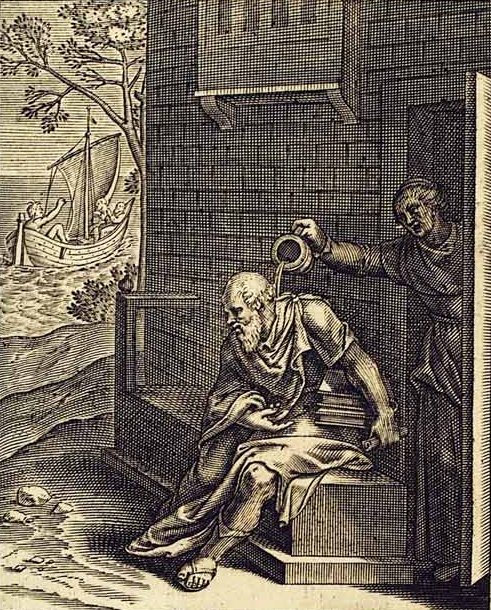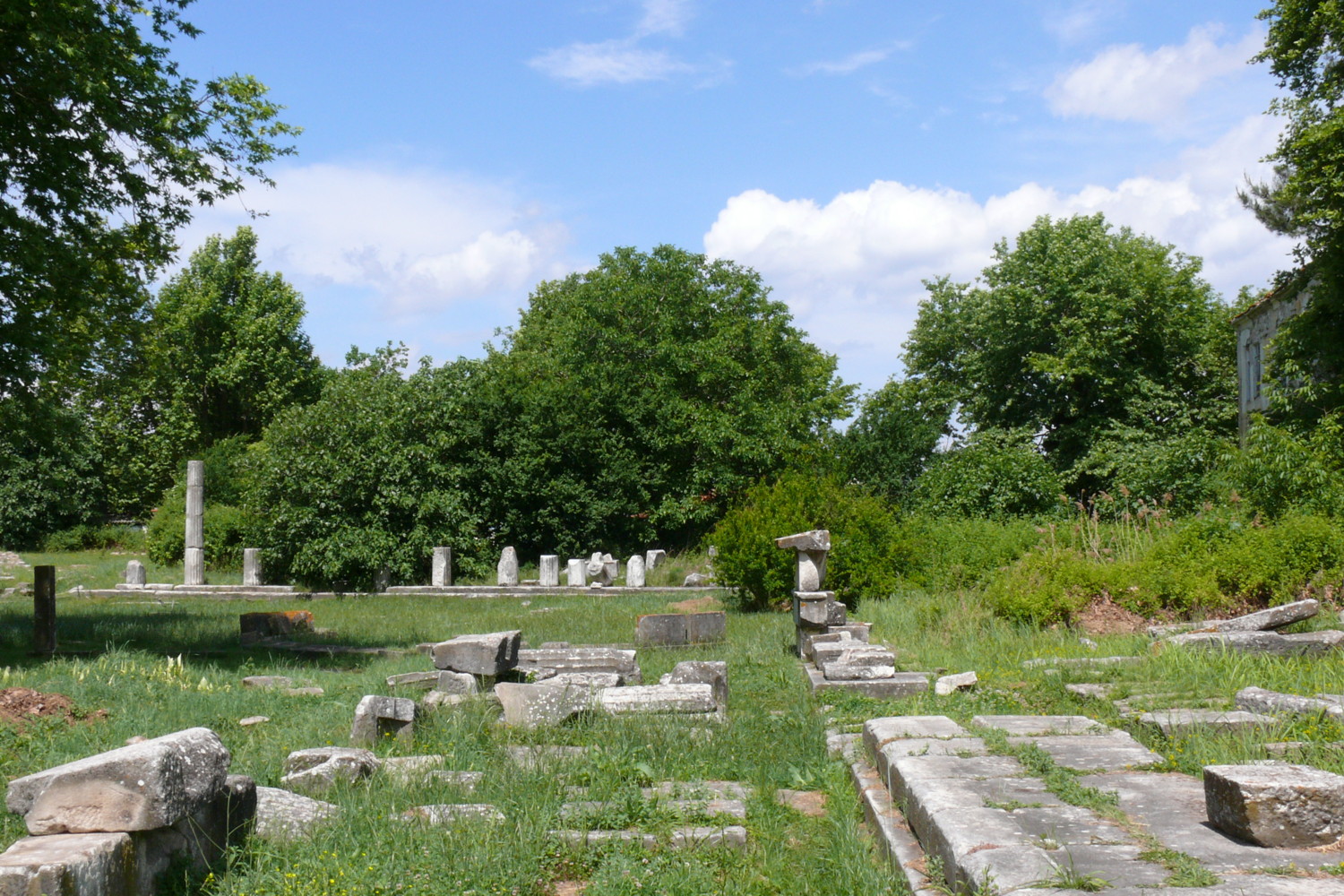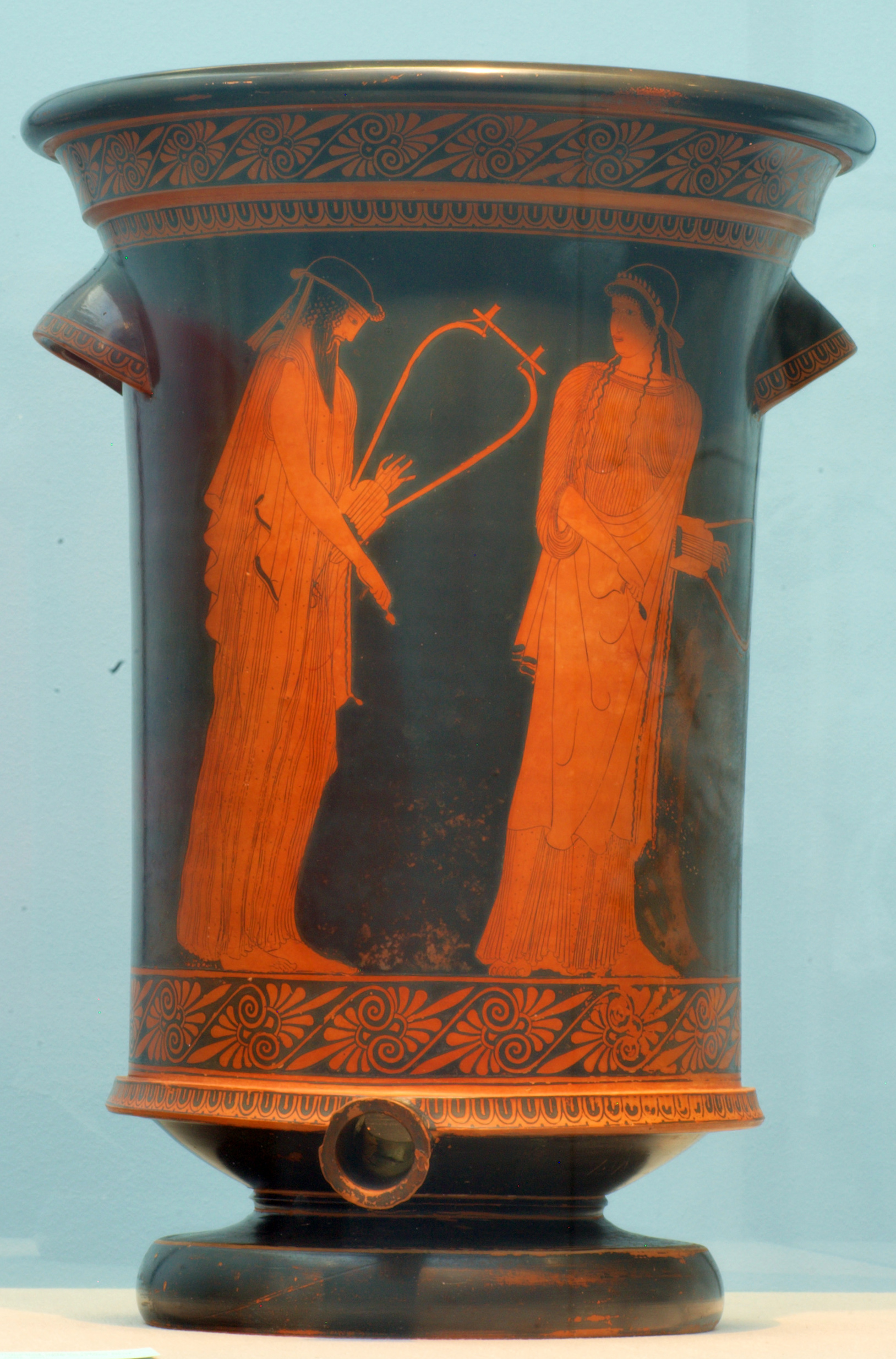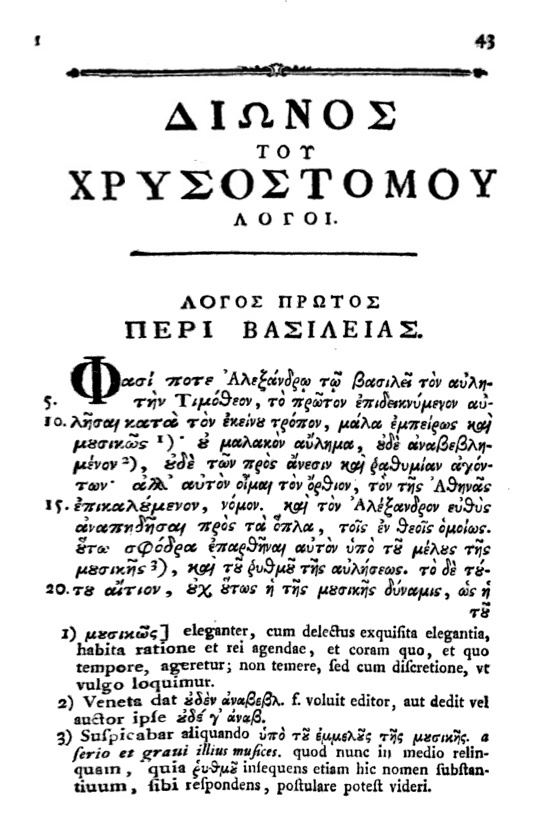|
Archilochus
Archilochus (; grc-gre, Ἀρχίλοχος ''Arkhilokhos''; c. 680 – c. 645 BC) was a Greek lyric poet of the Archaic period from the island of Paros. He is celebrated for his versatile and innovative use of poetic meters, and is the earliest known Greek author to compose almost entirely on the theme of his own emotions and experiences. Biography A considerable amount of information about the life of Archilochus has come down to the modern age via his surviving work, the testimony of other authors, and inscriptions on monuments, yet it all needs to be viewed with caution – the biographical tradition is generally unreliable and the fragmentary nature of the poems does not really support inferences about his personal history. The vivid language and intimate details of the poems often look autobiographical yet it is known, on the authority of Aristotle, that Archilochus sometimes role-played. The philosopher quoted two fragments as examples of an author speaking in some ... [...More Info...] [...Related Items...] OR: [Wikipedia] [Google] [Baidu] |
Iambus (genre)
Iambus or iambic poetry was a genre of ancient Greek poetry that included but was not restricted to the iambic meter and whose origins modern scholars have traced to the cults of Demeter and Dionysus. The genre featured insulting and obscene language and sometimes it is referred to as "blame poetry". For Alexandrian editors, however, iambus signified any poetry of an informal kind that was intended to entertain, and it seems to have been performed on similar occasions as elegy even though lacking elegy's decorum. The Archaic Greek poets Archilochus, Semonides and Hipponax were among the most famous of its early exponents. The Alexandrian poet Callimachus composed "iambic" poems against contemporary scholars, which were collected in an edition of about a thousand lines, of which fragments of thirteen poems survive. He in turn influenced Roman poets such as Catullus, who composed satirical epigrams that popularized Hipponax's choliamb. Horace's '' Epodes'' on the other hand ... [...More Info...] [...Related Items...] OR: [Wikipedia] [Google] [Baidu] |
Archaic Greece
Archaic Greece was the period in Greek history lasting from circa 800 BC to the second Persian invasion of Greece in 480 BC, following the Greek Dark Ages and succeeded by the Classical period. In the archaic period, Greeks settled across the Mediterranean and the Black Seas, as far as Marseille in the west and Trapezus (Trebizond) in the east; and by the end of the archaic period, they were part of a trade network that spanned the entire Mediterranean. The archaic period began with a massive increase in the Greek population and of significant changes that rendered the Greek world at the end of the 8th century entirely unrecognisable from its beginning. According to Anthony Snodgrass, the archaic period was bounded by two revolutions in the Greek world. It began with a "structural revolution" that "drew the political map of the Greek world" and established the '' poleis'', the distinctively Greek city-states, and it ended with the intellectual revolution of the Classical per ... [...More Info...] [...Related Items...] OR: [Wikipedia] [Google] [Baidu] |
Paros
Paros (; el, Πάρος; Venetian: ''Paro'') is a Greek island in the central Aegean Sea. One of the Cyclades island group, it lies to the west of Naxos, from which it is separated by a channel about wide. It lies approximately south-east of Piraeus. The Municipality of Paros includes numerous uninhabited offshore islets totaling of land. Its nearest neighbor is the municipality of Antiparos, which lies to its southwest. In ancient Greece, the city-state of Paros was located on the island. Historically, Paros was known for its fine white marble, which gave rise to the term "Parian" to describe marble or china of similar qualities. Today, abandoned marble quarries and mines can be found on the island, but Paros is primarily known as a popular tourist spot. Geography Paros' geographic co-ordinates are 37° N. latitude, and 25° 10' E. longitude. The area is . Its greatest length from N.E. to S.W. is , and its greatest breadth . The island is of a round, plump-pear shape, form ... [...More Info...] [...Related Items...] OR: [Wikipedia] [Google] [Baidu] |
Thasos
Thasos or Thassos ( el, Θάσος, ''Thásos'') is a Greek island in the North Aegean Sea. It is the northernmost major Greek island, and 12th largest by area. The island has an area of and a population of about 13,000. It forms a separate regional unit within the East Macedonia and Thrace region. Before the local administration reform of 2011, it was part of the Kavala Prefecture. The largest town and the capital is Thasos, officially known as ''Limenas Thasou'', "Port of Thasos", situated at the northern side. It is connected with the mainland by regular ferry lines between Keramoti and Thassos town, and between the regional centre of Kavala and Skala Prinou. Thasos's economy relies on timber from its forests, marble quarries, olive oil, and honey. Tourism has also become important since the 1960s, although not to the level of other Greek islands. History Mythology Staphylus ( grc, Στάφυλος), the beloved son of god Dionysus, lived in Thasos. Prehistory Lyi ... [...More Info...] [...Related Items...] OR: [Wikipedia] [Google] [Baidu] |
Greek Lyric Poet
Greek lyric is the body of lyric poetry written in dialects of Ancient Greek. It is primarily associated with the early 7th to the early 5th centuries BC, sometimes called the "Lyric Age of Greece", but continued to be written into the Hellenistic and Imperial periods. Background Lyric is one of three broad categories of poetry in classical antiquity, along with drama and epic, according to the scheme of the "natural forms of poetry" developed by Goethe in the early nineteenth century. (Drama is considered a form of poetry here because both tragedy and comedy were written in verse in ancient Greece.) Culturally, Greek lyric is the product of the political, social and intellectual milieu of the Greek ''polis'' ("city-state"). Much of Greek lyric is occasional poetry, composed for public or private performance by a soloist or chorus to mark particular occasions. The symposium ("drinking party") was one setting in which lyric poems were performed.Miller, ''Greek Lyric: An Antholo ... [...More Info...] [...Related Items...] OR: [Wikipedia] [Google] [Baidu] |
Gyges Of Lydia
Gyges (, ; Lydian: ;Akkadian: , ; grc, Γύγης, Gugēs; la, Gygēs; reigned c. 680-644 BC) was the founder of the Mermnad dynasty of Lydian kings and the first known king of the Lydian kingdom to have attempted to transform it into a powerful empire. Attestations and etymology The name is derived from the Ancient Greek form ( grc, Γυγης) recorded by Graeco-Roman authors. In addition, the annals of the Assyrian king Ashurbanipal refer several times to , king of , to be identified with Gyges, king of the Lydians. and are respectively the Akkadian and Greek forms of the Lydian name (), which means "grandfather". is derived from a common Proto-Indo-European root from which evolved Hittite (), Luwian () and (), and Lycian () in the Anatolian languages family, as well as Latin , all meaning "grandfather". Another derivation for suggests that it might be a loanword from Carian (), which was represented in Greek as (), and was a cognate of the variou ... [...More Info...] [...Related Items...] OR: [Wikipedia] [Google] [Baidu] |
Galen
Aelius Galenus or Claudius Galenus ( el, Κλαύδιος Γαληνός; September 129 – c. AD 216), often Anglicized as Galen () or Galen of Pergamon, was a Greek physician, surgeon and philosopher in the Roman Empire. Considered to be one of the most accomplished of all medical researchers of antiquity, Galen influenced the development of various scientific disciplines, including anatomy, physiology, pathology, pharmacology, and neurology, as well as philosophy and logic. The son of Aelius Nicon, a wealthy Greek architect with scholarly interests, Galen received a comprehensive education that prepared him for a successful career as a physician and philosopher. Born in the ancient city of Pergamon (present-day Bergama, Turkey), Galen traveled extensively, exposing himself to a wide variety of medical theories and discoveries before settling in Rome, where he served prominent members of Roman society and eventually was given the position of personal physician to se ... [...More Info...] [...Related Items...] OR: [Wikipedia] [Google] [Baidu] |
Dio Chrysostom
Dio Chrysostom (; el, Δίων Χρυσόστομος ''Dion Chrysostomos''), Dion of Prusa or Cocceianus Dio (c. 40 – c. 115 AD), was a Greek orator, writer, philosopher and historian of the Roman Empire in the 1st century AD. Eighty of his ''Discourses'' (or ''Orations''; ) are extant, as well as a few Letters and a mock essay "In Praise of Hair", as well as a few other fragments. His sobriquet ''Chrysostom'' comes from the Greek (), which literally means "golden-mouthed". Life He was born at Prusa (now Bursa), in the Roman province of Bithynia (now part of northwestern Turkey). His father, Pasicrates, seems to have bestowed great care on his son Dio's education. At first he lived in Prusa, where he held important offices, composed speeches and other rhetorical and sophistical essays, and studied philosophy. The Stoic and Platonist philosophies, however, appear to have had the greatest charms for him, particularly the stoicism of Musonius Rufus. He went to Rome during ... [...More Info...] [...Related Items...] OR: [Wikipedia] [Google] [Baidu] |
Aelius Aristides
Publius Aelius Aristides Theodorus ( grc-gre, Πόπλιος Αἴλιος Ἀριστείδης Θεόδωρος; 117–181 AD) was a Greek orator and author considered to be a prime example as a member of the Second Sophistic, a group of celebrated and highly influential orators who flourished from the reign of Nero until c. 230 AD. More than fifty of his orations and other works survive, dating from the reigns of Antoninus Pius and Marcus Aurelius. His early success was interrupted by a decades-long series of illnesses for which he sought relief by divine communion with the god Asclepius, effected by interpreting and obeying the dreams that came to him while sleeping in the god's sacred precinct; he later recorded this experience in a series of discourses titled ''Sacred Tales (Hieroi Logoi)''. In his later life, Aristides resumed his career as an orator, achieving such notable success that Philostratus would declare that "Aristides was of all the sophists most deeply vers ... [...More Info...] [...Related Items...] OR: [Wikipedia] [Google] [Baidu] |
Palatine Anthology
The ''Palatine Anthology'' (or ''Anthologia Palatina''), sometimes abbreviated ''AP'', is the collection of Greek poems and epigrams discovered in 1606 in the Palatine Library in Heidelberg. It is based on the lost collection of Constantinus Cephalas of the 10th century, which in turn is based on older anthologies. It contains material from the 7th century BC until 600 AD and later on was the main part of the '' Greek Anthology'' which also included the '' Anthology of Planudes'' "The Greek Anthology as we have it today consists of the fifteen Books of the Palatine Anthology followed by a 'Planudean Appendix' of 388 poems occurring in Planudes but not in the Palatine manuscript..." and more material. The manuscript of the ''Palatine Anthology'' was discovered by Saumaise (Salmasius) in 1606 in the Palatine library at Heidelberg (Codex Palatinus 23). In 1623, after the Thirty Years' War, it was sent with the rest of the Palatine Library to Rome as a present from Maximilian I of ... [...More Info...] [...Related Items...] OR: [Wikipedia] [Google] [Baidu] |
Demeter
In ancient Greek religion and Greek mythology, mythology, Demeter (; Attic Greek, Attic: ''Dēmḗtēr'' ; Doric Greek, Doric: ''Dāmā́tēr'') is the Twelve Olympians, Olympian goddess of the harvest and agriculture, presiding over crops, grains, food, and the fertility (soil), fertility of the earth. Although she is mostly known as a grain goddess, she also appeared as a goddess of health, birth, and marriage, and had connections to the Greek Underworld, Underworld. She is also called Deo (). In Greek tradition, Demeter is the second child of the Titans Rhea (mythology), Rhea and Cronus, and sister to Hestia, Hera, Hades, Poseidon, and Zeus. Like her other siblings but Zeus, she was swallowed by her father as an infant and rescued by Zeus. Through her brother Zeus, she became the mother of Persephone, a fertility goddess. One of the most notable Homeric Hymns, the ''Homeric Hymn to Demeter'', tells the story of Persephone's abduction by Hades and Demeter's search for her. ... [...More Info...] [...Related Items...] OR: [Wikipedia] [Google] [Baidu] |
Polygnotus
Polygnotus ( el, Πολύγνωτος ''Polygnotos'') was an ancient Greek painter from the middle of the 5th century BC. Life He was the son and pupil of Aglaophon. He was a native of Thasos, but was adopted by the Athenians, and admitted to their citizenship. During the time of Cimon, Polygnotus painted for the Athenians a picture of the taking of Troy on the walls of the Stoa Poikile, and another of the marriage of the daughters of Leucippus in the Anacaeum. Plutarch mentions that historians and the poet Melanthius attest that Polygnotus did not paint for the money but rather out of a charitable feeling towards the Athenian people. In the hall at the entrance to the Acropolis other works of his were preserved. The most important of his paintings were his frescoes in the Lesche of the Knidians, a building erected at Delphi by the people of Cnidus. The subjects of these were the visit to Hades by Odysseus and the taking of Troy. The traveller Pausanias recorded a car ... [...More Info...] [...Related Items...] OR: [Wikipedia] [Google] [Baidu] |






.jpg)
_-_Veloso_Salgado.png)


